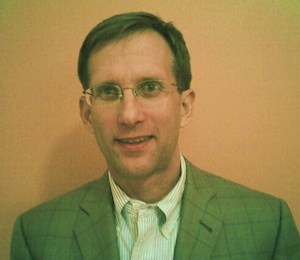 Alan Kay recently outlined some of the principles that he thought made Xerox's PARC so successful (if you don't know who Alan Kay is or why PARC was so special, you should try to find out). One was: "'It's baseball,' not 'golf'...Not getting a hit is not failure but the overhead for getting hits." That doesn't quite square with my impression of golf, but I take the point. It's about the price of success. As psychologist Dean Simonton pointed out in Origins of Genius: "The more successes there are, the more failures there are as well." "Quality," he wrote, "is a probabilistic function of quantity." We talk a lot about innovation these days, especially "disruptive innovation." Why not? It sounds cool, it allows people to think they're on the cutting edge, and it often excites investors. But perhaps we've lost sight of what it is supposed to actually be...
Alan Kay recently outlined some of the principles that he thought made Xerox's PARC so successful (if you don't know who Alan Kay is or why PARC was so special, you should try to find out). One was: "'It's baseball,' not 'golf'...Not getting a hit is not failure but the overhead for getting hits." That doesn't quite square with my impression of golf, but I take the point. It's about the price of success. As psychologist Dean Simonton pointed out in Origins of Genius: "The more successes there are, the more failures there are as well." "Quality," he wrote, "is a probabilistic function of quantity." We talk a lot about innovation these days, especially "disruptive innovation." Why not? It sounds cool, it allows people to think they're on the cutting edge, and it often excites investors. But perhaps we've lost sight of what it is supposed to actually be...
Fast Company
See the following -
An Apple Employee Admits That iPhone Won't Deliver iMessage Texts To Android
...an Apple customer support employee has admitted to Lifehacker's Adam Pash that, in fact, "a lot" of users have this problem: If you switch from an iPhone to an Android, iMessage won't deliver texts from iPhone users to your new Android phone...
- Login to post comments
And We Thought Pandemics Were Bad...Time to Examine The Threat from Microplastics
 The ocean full of microplastics, and fish are as well. They're in our drinking water. Indeed, "There's no nook or cranny on the surface of the earth that won't have microplastics," Professor Janice Brahney told The New York Times. Dr. Brahney was coauthor on a recent study that found microplastics were pervasive even in supposedly pristine parts of the Western U.S. They estimated that 1,000 tons of "plastic rain" falls every year onto protected areas there; 98% of soil samples they took had microplastics. Dr. Brahney pointed out that, because the particles are both airborne and fine, "we're breathing it, too." She admitted: "It's really unnerving to think about it."
The ocean full of microplastics, and fish are as well. They're in our drinking water. Indeed, "There's no nook or cranny on the surface of the earth that won't have microplastics," Professor Janice Brahney told The New York Times. Dr. Brahney was coauthor on a recent study that found microplastics were pervasive even in supposedly pristine parts of the Western U.S. They estimated that 1,000 tons of "plastic rain" falls every year onto protected areas there; 98% of soil samples they took had microplastics. Dr. Brahney pointed out that, because the particles are both airborne and fine, "we're breathing it, too." She admitted: "It's really unnerving to think about it."
- Login to post comments
Et Tu, Oscar? Are You Reinventing Health Insurance? Or, Just Repackaging an Old Plan?
 I've previously expressed my concern that Oscar and some of its fellow health insurance start-ups might be more about repackaging than reinventing. I'm more concerned than ever after Bloomberg reported that Oscar is adopting a new network strategy: moving to "tight, exclusive networks with hospitals." Oscar CEO Mario Schlosser said: "The bet we made in going deep with a couple of health systems, I love what we’re doing there. We’ve got a very good blueprint now to go into new markets."
I've previously expressed my concern that Oscar and some of its fellow health insurance start-ups might be more about repackaging than reinventing. I'm more concerned than ever after Bloomberg reported that Oscar is adopting a new network strategy: moving to "tight, exclusive networks with hospitals." Oscar CEO Mario Schlosser said: "The bet we made in going deep with a couple of health systems, I love what we’re doing there. We’ve got a very good blueprint now to go into new markets."
- Login to post comments
Healthcare Innovation: Think Bigger, Fail Often.
- Login to post comments
Innovation Needs Dumb Ideas
 Over the years I've listened to many new-to-health-care entrepreneurs pitch their great new idea. They're so excited: health care is so inefficient! People are so frustrated by the system! It will be so easy to improve it! I usually end up thinking, "Oh, you poor people. You really don't know much about health care, do you?" They don't fully grasp the strange way it is bought and sold, the convoluted financing, or the layers of regulation. So I wish them well and wait to hear about their eventual failure. But now I'm thinking, maybe it is experts like me who are part of health care's problem. In Harvard Business Review, Ayse Birsel suggests that companies need to do more "reverse thinking," deliberately thinking up wrong ideas...
Over the years I've listened to many new-to-health-care entrepreneurs pitch their great new idea. They're so excited: health care is so inefficient! People are so frustrated by the system! It will be so easy to improve it! I usually end up thinking, "Oh, you poor people. You really don't know much about health care, do you?" They don't fully grasp the strange way it is bought and sold, the convoluted financing, or the layers of regulation. So I wish them well and wait to hear about their eventual failure. But now I'm thinking, maybe it is experts like me who are part of health care's problem. In Harvard Business Review, Ayse Birsel suggests that companies need to do more "reverse thinking," deliberately thinking up wrong ideas...
- Login to post comments
Taking Lessons from the Open Source Movement & Craft Brewers, Doctor Revolutionizing Healthcare
 Pioneering doctors are showing the way to a much higher performing system as I highlighted in Doctors' Declaration of Independence. They understand that every example of great societal movements to our toughest challenges have come from the bottom up. The fundamental structure of politics is to cement the status quo. If the status quo was performing well that would be OK, but it's clearly failing miserably. In fact, Chapter 1 of my new book is "America Has Gone to War for Less" (link to free copy of the book below) referring to the collateral damage from this wildly underperforming status quo. Fortunately, doctors are collaborating to change this such as the Direct Primary Care conference starting today in Orlando.
Pioneering doctors are showing the way to a much higher performing system as I highlighted in Doctors' Declaration of Independence. They understand that every example of great societal movements to our toughest challenges have come from the bottom up. The fundamental structure of politics is to cement the status quo. If the status quo was performing well that would be OK, but it's clearly failing miserably. In fact, Chapter 1 of my new book is "America Has Gone to War for Less" (link to free copy of the book below) referring to the collateral damage from this wildly underperforming status quo. Fortunately, doctors are collaborating to change this such as the Direct Primary Care conference starting today in Orlando.
- Login to post comments
The Most Important Health Care Jobs of the Future
 Fast Company ran an interesting article The Most Important Design Jobs of the Future, predicting 18 of the most important design jobs of the future (at least 3 to 5 years out). A couple of them were in health care, and arguably all of them would have some impact on health care, but I thought it might be fun to do a similar list specific to health care, and not limited to design. Let's hope no one comes back in a few years to show how wrong I was. I'll skip the usual suspects -- e.g., doctors, nurses, pharmacists. Yes, those jobs will (almost) certainly still be around, but they may not be central as they are today. And those jobs will evolve in ways that reflect the trends illustrated by the jobs I list...
Fast Company ran an interesting article The Most Important Design Jobs of the Future, predicting 18 of the most important design jobs of the future (at least 3 to 5 years out). A couple of them were in health care, and arguably all of them would have some impact on health care, but I thought it might be fun to do a similar list specific to health care, and not limited to design. Let's hope no one comes back in a few years to show how wrong I was. I'll skip the usual suspects -- e.g., doctors, nurses, pharmacists. Yes, those jobs will (almost) certainly still be around, but they may not be central as they are today. And those jobs will evolve in ways that reflect the trends illustrated by the jobs I list...
- Login to post comments
The U.S. Air Force learned to code—and saved the Pentagon millions
 The notable thing about the decision to start working on low-level code—and about all of the team’s decisions—is that it was made on the fly, based on real-time conversations about users’ needs. That’s nothing more than best practices for modern software development, but at the DoD, such agility would normally be impossible. Specifications commonly take years to write and then more years to deliver on before code can even be tested in the field—often making systems obsolete by the time they’re delivered. “The DoD violates pretty much every rule in modern product development,” Schmidt told U.S. Congress recently.
The notable thing about the decision to start working on low-level code—and about all of the team’s decisions—is that it was made on the fly, based on real-time conversations about users’ needs. That’s nothing more than best practices for modern software development, but at the DoD, such agility would normally be impossible. Specifications commonly take years to write and then more years to deliver on before code can even be tested in the field—often making systems obsolete by the time they’re delivered. “The DoD violates pretty much every rule in modern product development,” Schmidt told U.S. Congress recently.
- Login to post comments
Towards a New EHR Metaphor - Or, How to Fix Unusable EHRs
 News flash: docs hate Excel! In a recent study, which included researchers from Yale, the Mayo Clinic, Stanford, and the AMA, physicians rated it only at 57% on a usability rating, far below Google search (93%), Amazon (82%), or even Word (76%). But, of course, Excel wasn't their real problem; the study was aimed at electronic health records (EHRs), which physicians rated even lower: 45%, which the study authors graded an "F." If we want EHRs get better, though, we may need to start with a new metaphor for them.Lead author Edward Melnick, MD, explained the usability issue: "A Google search is easy. There's not a lot of learning or memorization; it's not very error-prone. Excel, on the other hand, is a super-powerful platform, but you really have to study how to use it. EHRs mimic that."
News flash: docs hate Excel! In a recent study, which included researchers from Yale, the Mayo Clinic, Stanford, and the AMA, physicians rated it only at 57% on a usability rating, far below Google search (93%), Amazon (82%), or even Word (76%). But, of course, Excel wasn't their real problem; the study was aimed at electronic health records (EHRs), which physicians rated even lower: 45%, which the study authors graded an "F." If we want EHRs get better, though, we may need to start with a new metaphor for them.Lead author Edward Melnick, MD, explained the usability issue: "A Google search is easy. There's not a lot of learning or memorization; it's not very error-prone. Excel, on the other hand, is a super-powerful platform, but you really have to study how to use it. EHRs mimic that."
- Login to post comments